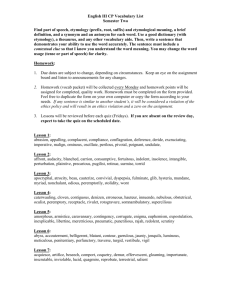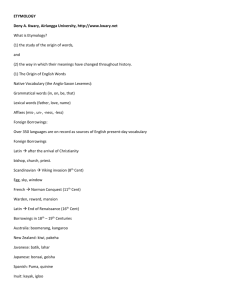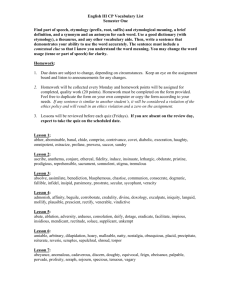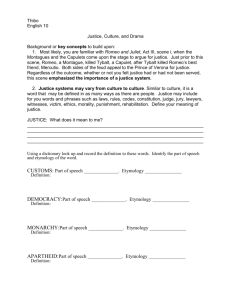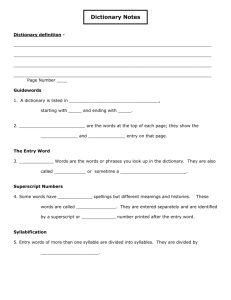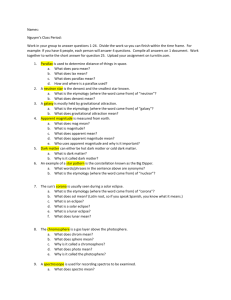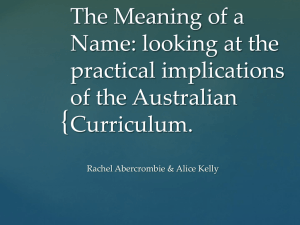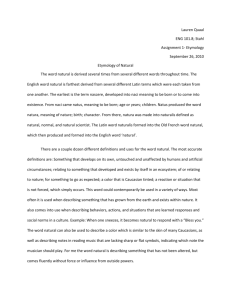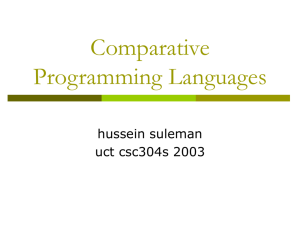ETYMOLOGY - unizd.hr
advertisement
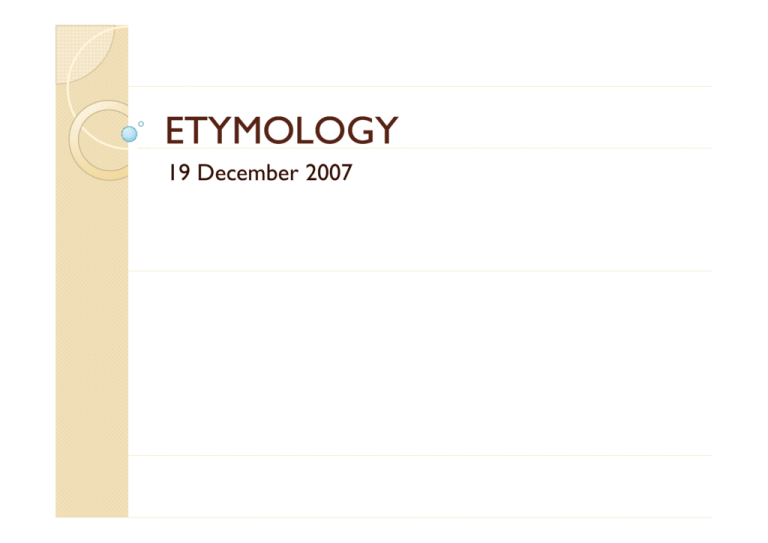
ETYMOLOGY 19 December 2007 Etymology Lexicology gy relies on information derived from morphology, p gy phonology, semantics, and etymology. y Usually defined as the study of the whole history of words, not just their origin. y The term originated in Ancient Greece, it comes from Old Greek etymon (true sense), and logos (word). While in classical time it was dealing with meanings, today etymology deals with the history of words The term was coined by the Stoics words. Stoics, a group of Greek philosophers from the 4th century BC. y Etymological information does not only provide the origin of the word It also makes reference to cognates word. cognates, i.e. i e word word’ss relatives in form. This is important because the knowledge of a word’s etymology can help in understanding and retaining new vocabulary items. y Etymology y y Thee main a pproblem ob e o of etymological ety o og ca research esea c iss the t e fact act that the original meaning of a lexeme is unknowable. The meaning often changes, and if we go back looking at a word’s word s history, we could come to an era of which we have no information, but we know languages were spoken at that time, and words surely existed. Here we have to mention the semantic change. change We all know that words often change their meanings, and linguists have distinguished several kinds of semantic chan e We shall mention four change. fo r particularly artic larl im important ortant categories: Semantic change 1. 2 2. 3. 4. EXTENSION or GENERALIZATION. A lexeme widens its meaning. Numerous examples of extension occurred to words in the religious field. Words like office, doctrine, novice have taken on a more general meaning. NARROWING or SPECIALIZATION. SPECIALIZATION A lexeme becomes more specialized in meaning. Engine was formerly used in general sense of mechanical device, machine, but since the Industrial Revolution it has come to mean mechanical source of power. AMELIORATION A lexeme AMELIORATION. l develops d l a positive i i sense off approval.l Revolutionary once meant an undesirable overthrowing of the status quo but now it is used as a signal of desirable novelty. PEJORATION or DETERIORATION. A lexeme develops a negative sense of disapproval. In Middle English villein neutrally described a serf, whereas Modern English villain isn’t at all neutral. Semantic change y y y y SILLY ((Modern English) g ) Old English – saelig ≈ «happy, blessed» Middle English – seely ≈ «innocent» Modern English – silly ≈ «weak» x x «simple, ignorant» «foolish, empty-headed» Etymology 1. 2. 3. PUNCH – the name of the drink has nothingg to do with the effect that it can have on the drinker. The recipe of the drink originated in India,and the name comes from the Hindi word for five, because there are five ingredients involved in making the beverage. beverage CANDIDATE – denotes a person running for an office or seeking honour. It was borrowed from Latin candidatus, which originally meant clothed in white, because in ancient Rome candidates for political office wore white togas. In Latin candidus means white. NICE – earlier meant fastidious, and before that, in ME, it meant ffoolish or ignorant, g , when it was borrowed from Old French nice (silly). If we go further, we can see that French form originated in Latin nescius (ignorant). Folk etymology When people hear a foreign or unfamiliar word for the first time, they try to make sense of it by relating it to words they know well. However, they often guess wrongly, and if enough people make the same wrong guess, the error can become part of the language. Such erroneus forms are called folk p etymologies. y g or ppopular y One very good example is the word bridegroom. It is a compound of bride and groom. To groom means to take care of animals, and especially of horses. y The original OE form was brydguma (bryd+guma). In ME it had the form b id bridgome. H However the h noun gome died di d out during d i the h ME period i d and d its i meaning was no longer apparent, and it came to be popularly replaced by a similar sounding word grome (serving lad), which later developed the sense of servant having the care of horses. But bridegroom never meant anything more than bride’s ’ man. y Names y y y y One of the most popular aspects of etymology is the history of names. The linguistic study d off names is i called ll d onomastics. i Among A its i branches b h are the h study d off personall names (anthroponomastics), and place names (toponomastics). But these days the subject deals with far more than etymology, and investigates a wide range of social, psychological, and legal questions. Wh we talk When lk about b personall names, we talk lk about b fifirst names, surnames, and d nicknames. Other types of names are place names, object names, and so on. The source of English first names is primarily the Bible. Most of biblical names are Hebrew in origin, but some of them are of Greek or Latin origin. Other names in the h contemporary use were introduced i d d to England E l d by b the h Normans N in i the h 11th 11 h century. Many Germanic names already existed in Anglo-Saxon society. In the early Middle Ages there were only first names; surnames came later. Surnames are additional names used to identify people with the same first name. Naming objects We can give an individual name to any entity or concept. We usually name things on the basis of their relevance to our lives: people and places where we live are on the top, animals (but not all – pets), objects which move us about in groups (locomotives, aeroplanes, buses and boats)... y On the other hand we do not normally name objects which are easily replaced, such as pencils, bags,... y When we speak about naming objects, we definitely have to mention a process where names are used in the formation of new lexemes. When a personall name iis used d in i this hi way, it i is i known k as an eponym, and d the h process is known as EPONYMY. We can also define eponyms as new words based on names. The number of new words of this type in fields like biology, physics,and medicine is very large, since new discoveries are very often f named for f their discoverers. y EPONYMY EPONYMY – a process where names are used in the formation of new lexemes. EPONYM – a personal name used in this way Four groups of eponyms: 1. based on personal names, e.g. y boycott – Charles Boycott, an English land agent in Ireland y dahlia – Anders Dahl, a Swedish botanist y cardigan – Earl of Cardigan in 19th century, his favourite waistcoat y guy – Guy Fawkes, Catholic conspirator y lynch y – Capt. p William Lynch, y in 1780 a pplanter in colonial Virginia g y nicotine – Jacques Nicot introduced tobacco into France in 1560 y sandwich – 18th century British nobleman, the Earl of Sandwich Eponymy 2. Based on geographical names, e.g. y bikini – the islands where the atom bomb was tested y china – short for chinaware, from china-clay used in the manufacture of porcelain, originally made in China y denim – cotton cloth now, originally serge, made in the town of Nimes in Southern France, hence serge de Nimes y hamburger – from Hamburg steak found in Hamburg in the 19th century and brought to the US by German immigrants y jeans – originally from the Italian city of Genova, where the cloth was first made, as in blue jeans. In Old Frensh Genova had the form Janne, and from this came the English form. y turkey – an American bird, confused in America at first with an African bird, brought into Europe through Turkey, whence the name. Eponymy 3. Based on fictitious names from literature, mythology and folklore y morphine – Morpheus was the son of the Greek God of sleep y panic – noises which caused fear in the flocks by night were attributed in Ancient Greece to Pan, God of Misdeeds y atlas – Atlas was condemned by Zeus to support the earth on his shoulders 4B 4. Based d on commerciall brand b d names y Band-aid ( a band-aid) – referring to all small bandages y Levis (a pair of levis) – referring to all denim-like trousers y Xerox (to xerox a document) – referring to copying by any dry process y Kleenex (a kleenex) – all facial tissues In Croatian we also have this, e.g. kalodont, digitron, ... Place names Place names, or toponyms, constitute one of the most established domains of onomastics. Place names can provide a unique source of information about a society’s history, structure, customs, and values. y To understand how places came to be named, it is helpful to put ourselves in the position of the Anglo-Saxon invaders of the 5th century century, faced with vast tracts of unnamed Britain. What did they do? y In some cases, they took over a name already in use by the inhabitants they found there. Several river names are Celtic, such as Thames, etc. y They also kept some of the place names introduced by the Romans during the period of occupation. There are over 200 modern British place names which have Roman origins, notably those ending in –port, -chester, -caster, street. y Place names Families or tribal groups would settle in a locality, which would then become known by the head person’s name. For example, Reading (place of Reada’s people), Nottingham (home of Snotta’s people), etc. y Names relating to religious beliefs and practices, both pagan and Christian, are well represented: e.g. e g Westminster, Westminster Whitchurch, Whitchurch St Ives Ives, etc etc. y The largest number of place-names relate to topography – to the coastline, hills, woods, trees, stones, fields, and other physical features. e.g. g –by, y, -ton,, -ham,, -wick/-wic = dwellings g and farms;; -brook, -ford, -pool, -well = rivers and streams; -derry, -heath, -moor, -wood = woods and groves; -caster caster, -church church, -kirk kirk, -minster minster, -stone stone = buildings and stones... y English place names in the world y y y y y y A notable feature of early British toponyms is the absence of commemorative personall names. Th The Anglo-Saxons A l S named d places l after f the h chief hi f person who h lived li d there, but rarely used the name of a famous person from elsewhere. Things have not much changed in Britain, but if we go abroad we can see that the English act in very different ways. All over the New World, famous people are commemorated d in i ways that h are thoroughly h hl alien li within i hi Britain. Bi i The names used by the English-speaking countries of the world are remarkable in their diversity. So, we have names coined in the same way as in early Britain: e.g. Salt Lake City, Twin Peaks... Local native names are much in evidence: e.g. Saratoga, Oklahoma... Inspirational names have been imported from the Old World: Paris, Berlin, London, Memphis, *New Amsterdam... Then we have names from languages of the settlers: Los Angeles, Angeles Sacramento, Sacramento San Francisco; Montreal, Baton Rouge... English place names in the world An interesting thing are the names of the 50 American federal states. They got names from six sources: y 28 names came from native words, mainly American Indian, with one from Inuit, and one from Hawaiian. y 11 names are ffrom English, E li h bboth th people l and d places. l y 6 names came from Spanish. y 3 names came from French. y 1 name came ffrom D Dutch; h y One name came from America’s history. A lexical feature of the American states is that they have all been given nicknames – sometimes more than one. one Alabama Alabama, for example, example is also called the Cotton State, the Heart of Dixie; and Louisiana is called the Pelican State, the Creole State, and the Sugar State. y American States y Washington as gto – aafter te George Geo ge Washington as gto y Oregon – Algonquian ‘beautiful water’ y Idaho – Shoshone ‘light on the mountain’ y Montana – Spanish ‘mountains’ y North and South Dakota – Sioux ‘friend’ y Wisconsin – Algonquian ‘grassy grassy place’ place or ‘beaver beaver place’ place y Michigan – Chippewa ‘big water’ y Ohio – Iroquois ‘beautiful water’ y Florida – Spanish ‘land of flowers’ y Arizona – Papago ‘place of the small spring’ y Texas - Spanish ‘allies’ allies y Kentucky – Iroquois ‘meadow land’ y Utah – Navaho ‘upper land’ y Oklahoma – Choctaw ‘red people’

